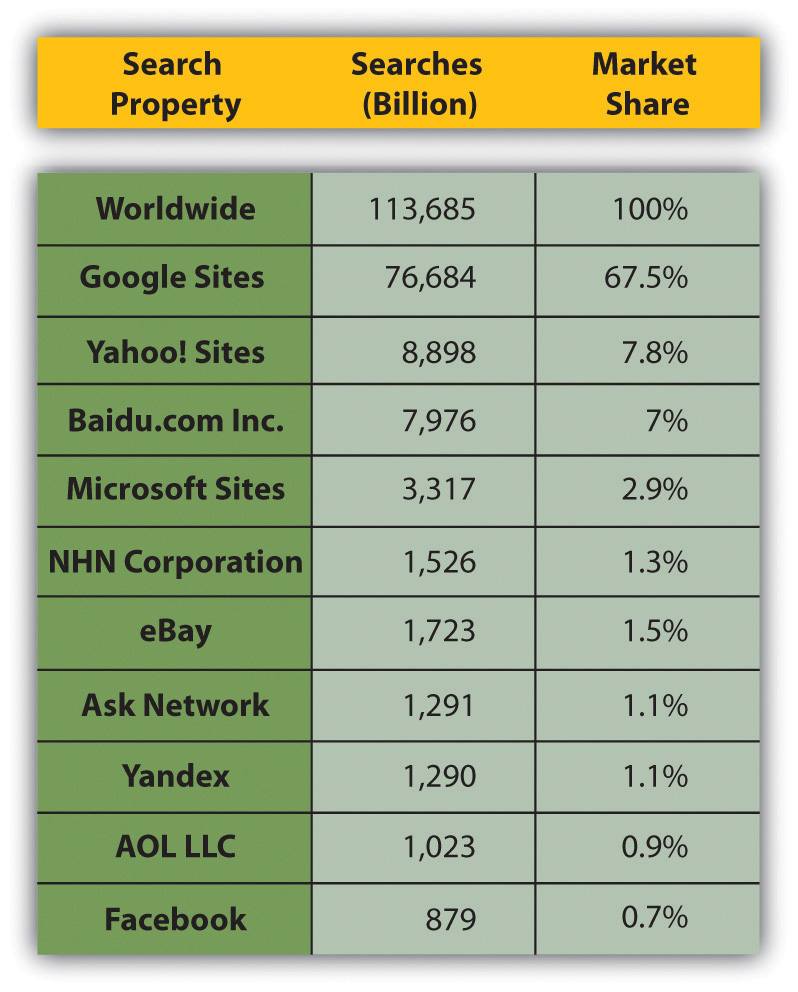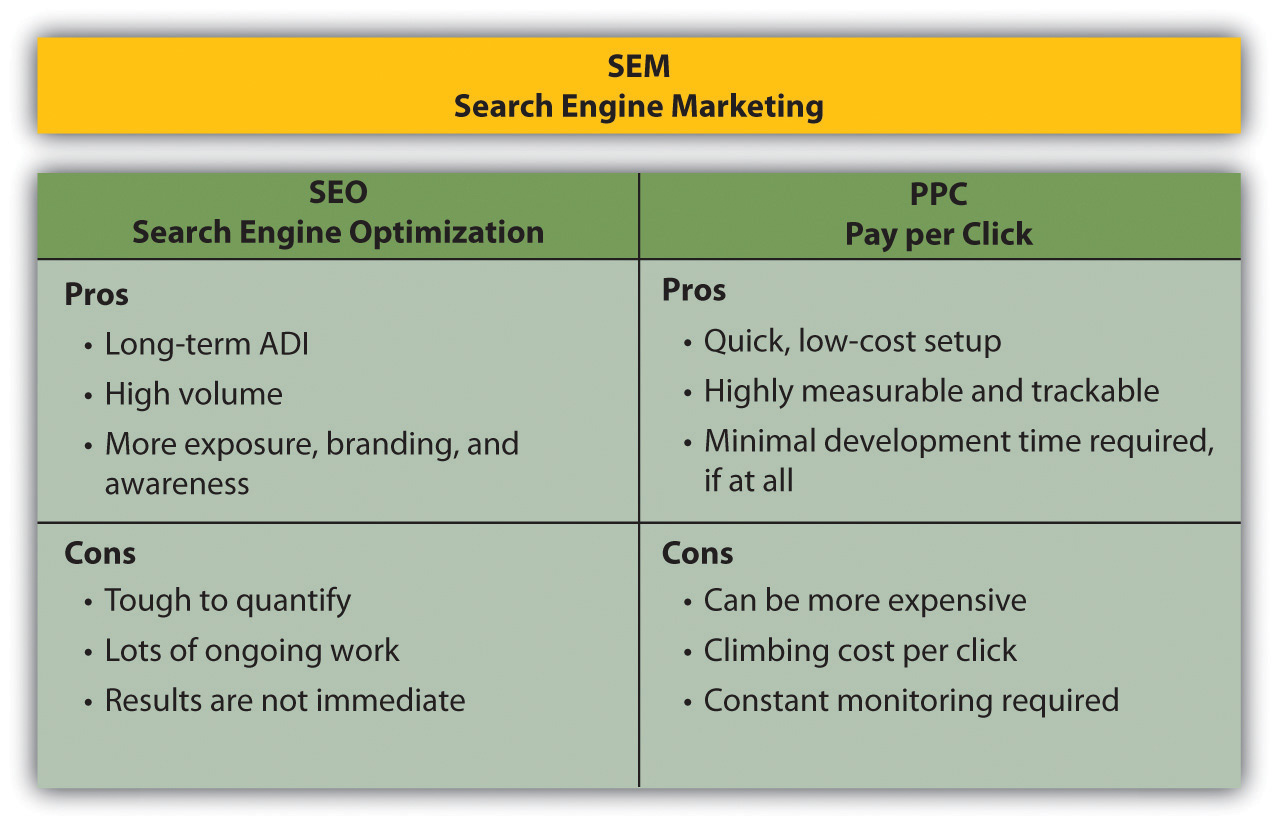Chapter 5- Search Engine Marketing
5.1 Introduction
Every day, all around the world, millions of people use search engines to find content on the Internet. Search engines are Web-based programs that index the Web and allow people to find what they are looking for. “Search,” or “search marketing,” is often used to refer to the industry that has built up around search engines.
5.2 Search Engine Optimization
LEARNING OBJECTIVES
- Learn how search engines work.
- Understand the difference between PPC (pay per click) and SEO (search engine optimization).
Google, Yahoo! and now Bing are all well-known international search engines. Google is by far the leading player in the market. A comScore study of worldwide search engine activity, released in July 2009, showed that Google has just over 67 percent of the global search engine market share.“Global Search Market Draws More Than 100 Billion Searches per Month,” press release, comScore, August 31, 2009, http://www.comscore.com/Press_Events/Press_Releases/2009/8/Global_Search_Market_Draws_More_than_100_ Billion_Searches_per_Month (accessed June 24, 2010).
When we talk “search,” we refer to two different kinds of results: organic search results and paid search results.
Figure 5.1 Global Search Engine Market Share

Organic Search Results
Organic search results are the primary product of a search engine. These results are the listings generally found on the left-hand side on the search engine results pages (SERPs). They are not influenced by financial payment and are therefore also called natural search results. Organic search results need to be consistently reliable to attract (and keep) users. Google’s growth and success as a search engine can be directly linked to its superior search algorithm, which returns highly relevant organic results.
Paid Search Results
Paid search, also known as pay-per-click (PPC) advertising, involves the displaying of sponsored results alongside the organic results. Advertisers bid for placement and pay the search engine when their advertisement is clicked on. Paid search results must be distinguished from organic results, since paid placement introduces bias. PPC advertisements are usually displayed at the top and on the right side of the SERPs. Search engines attract and keep users through organic search, but they make most of their money from paid search.
Figure 5.2 SERP Example

The Importance of Search to a Marketer
As search engines have become essential to a Web user’s Internet experience, so has search become essential to a marketer. Search is important for a number of reasons.
Search Is Goal Oriented: People Use Search to Find the Things They Want and Need
The Internet is a highly competitive environment, with literally billions of pages in existence. So how does anyone find the page they are after? Web users find what they need primarily via search. Search drives targeted traffic (and therefore sales) to Web sites. A Web search is a signal of intent from a Web user.
The Search Industry Is Big
The daily search-volume numbers are in the hundred millions. According to comScore figures, there were more than 14 billion searches in the United States alone in October 2009.“comScore Releases October 2009 U.S. Search Engine Rankings,” press release, comScore, November 17, 2009, http://www.comscore.com/Press_Events/Press_Releases/2009/11/comScore_Releases_October_2009_U.S._Search_Engine_Rankings (accessed June 24, 2010). That’s around 466 million per day.
To Be Found, You Must Be Visible
If you want your Web site to generate a significant amount of traffic, then it needs to be listed on the major search engines and listed high up enough to be seen. Statistics show that users are not likely to view listings beyond the first thirty results, with the top six (above the fold) listings enjoying the lion’s share of clicks.“Google Search’s Golden Triangle,” Eyetools, http://www.eyetools.com/inpage/research_google_eyetracking_heatmap.htm (accessed April 3, 2008).
Top of Search Equates to Top-of-Mind Awareness
Beyond traffic, a high-ranking Web site is valuable for brand perception. Web users often perceive search engine results as an indication of authority. Search visibility promotes brand recognition and research has shown that search engine listings can stimulate brand recall by a three-to-one margin.“The Brand Lift of Search,” Enquiro Search Solutions, December 2007, http://pages.enquiro.com/whitepaper-the-brand-lift-of-search.html (accessed June 24, 2010).
People Trust Organic Search
Research has shown that people find organic results more relevant and more trusted than paid search results.“Inside the Mind of the Searcher,” Enquiro Search Solutions, March 2004, http://pages.enquiro.com/whitepaper-inside-the-mind-of-the-searcher.html (accessed June 24, 2010).
Catch Potential Customers at Every Phase of the Buying Cycle
Most purchases are subject to a buying cycle. At different points in that cycle, prospects are searching with different key phrases. Give them what they want at each phase, and they will keep coming back until they are ready to buy. In addition, they will be ready to buy more quickly because information is the best way to shorten the buying cycle.
Many People Have a Search Engine as Their Browser Home Page
Often, the home page of a browser is set to a search engine. Many users enter URLs (uniform resource locators) into the search engine instead of the address bar of the browser—meaning that even if they know the URL of a Web site, they are finding it through search.
A Three-Way Relationship: Search Engines, Webmasters, and Users
Search engines, Internet users, and Web site owners are involved in a symbiotic, three-way relationship. Each party depends on the other two to get what they need.
Users Want to Find What They Are Looking For on the Internet
Web users use search engines to lead them to Web sites, and they favor search engines that deliver the most relevant and useful results.
Search Engines Want to Make Money from Selling Advertising
The more users they have, the more advertising search engines can sell. Therefore, search engines must list their results according to relevance and importance in order to attract and keep users. In turn, search engines favor sites that are relevant and useful to users.
Web Site Owners, Webmasters, and Online Marketers Want Search Engines to Send Traffic to Their Site
Web site owners want search engines to send traffic their way. Therefore, they need to make sure that their sites are relevant and important in both the eyes of the search engines and the users.
Larry Page and Sergey Brin sum it up in their pre-Google paper, “The Anatomy of a Large-Scale Hypertextual Web Search Engine”: “The most important measure of a search engine is the quality of its search results.”Sergey Brin and Lawrence Page, “The Anatomy of a Large-Scale Hypertextual Web Search Engine,” http://infolab.stanford.edu/~backrub/google.html (accessed April 3, 2008).
What Does a Search Engine Do?
Search engines have four main functions:
- They crawl the Web (via spiders).
- They index the Web documents and pages they find.
- They process user queries.
- They return ranked results from the index.
A search engine is made up of a number of parts working together:
- A crawling spider, also known as a Web crawler, robot, or bot, is an automated indexing program. It goes from page to page, following links and indexing or recording what it finds.
- The index is what the spider creates. It is a “library” of pages on the Internet, and it consists of tens of billions of pages. The search engine creates databases for keywords, so it knows where to go to when a user enters a query.
- The engine is the part that does the actual searching. Users input a search query by typing a keyword or key phrase into the search bar. The engine then checks its index to find relevant pages and delivers them ordered from most relevant and important to least relevant and unimportant.
- The SERP (search engine results page) is the ordered listing of results for the user’s query. A SERP contains a description and link to the result.
Search Engine Marketing
Search engine marketing (SEM) has two parts: search engine optimization (SEO) and PPC advertising. These correspond to the two types of search results.
Figure 5.3 SEO + PPC = SEM

SEO aims at improving a Web site’s ranking in the natural search results. PPC advertising involves bidding for placement in the paid search results section of the SERP.
Both SEO and PPC advertising are based around the same fundamental concept: keywords.
Keywords: Making Sense of It All
Keywords, or key phrases, are what a user enters into a search engine query to find Web sites. Both SEO and PPC advertising involve selecting the keywords that are relevant to a company’s Web site and are used by potential customers. SEO aims to have a Web site rank in the natural results for its target keywords. In PPC advertising, the advertiser bids on desired keywords to achieve rankings in the paid results.
The following two chapters deal with the two divisions of search engine marketing: SEO and PPC.
KEY TAKEAWAYS
- Google owns the largest share of the search market.
- Organic search results typically appear on the left-hand side, while the paid placement typically appears on the right.
Search is important for a variety of reasons:
- Search is goal oriented: people use search to find things they want and need.
- Search engines are the doorway to the Internet.
- The search industry is big.
- Top of search equates to top-of-mind awareness.
- People trust organic search.
- Search reaches people at every phase of the buying cycle.
- Many users have a search engine as their browser home page.
There is a three-way relationship among search engines, Webmasters, and users.
- Users want to find what they are looking for on the Internet.
- Search engines want to make money from selling advertising.
- Webmasters and online marketers want search engines to send traffic to their site.
There are four main functions of a search engine:
- Crawl the Web (via spiders)
- Index documents and pages
- Process user queries
- Return ranked results from the index
- SEO + PPC = SEM
EXERCISE
- Evaluate the list of pros and cons for SEM. Describe in your own words why you think it may be important to use both parts of SEM. What may happen if you only use PPC? Or only SEO?
5.3 References
“61 Billion Searches Conducted Worldwide in August,” press release, comScore, October 10, 2007, http://www.comscore.com/press/release.asp?press=1802 (accessed June 9, 2008).
“comScore Releases 2008 U.S. Search Engine Rankings,” press release, comScore, February 21, 2008, http://www.comscore.com/press/release.asp?press=2068 (accessed April 3, 2008).
“comScore Releases March 2008 European Search Rankings,” press release, comScore, May 7, 2008, http://www.comscore.com/press/release.asp?press=2208 (accessed June 1, 2008).
“Global Search Market Share, July 2009 vs. July 2008,” Search Engine Watch, September 1, 2009, http://searchenginewatch.com/3634922 (accessed June 24, 2010).
Rand Fishkin, The Beginner’s Guide to SEO, SEOmoz, February 25, 2006, http://www.seomoz.org/article/beginners-guide-to-search-engine-optimization (accessed April 3, 2008).
“Technology Overview,” Google, http://www.google.com/technology (accessed April 3, 2008).